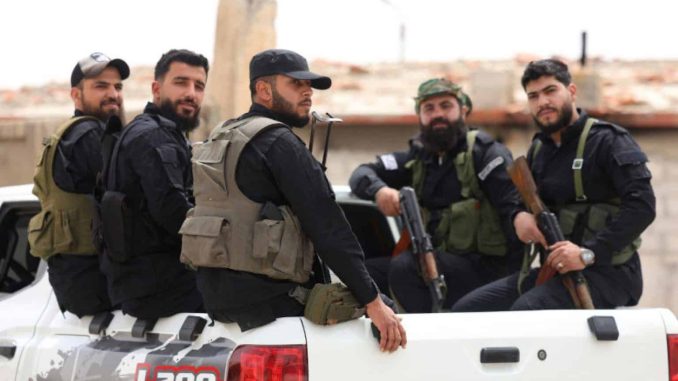Peloni: In recent days, a well informed source has related that a former journalist for a major network who started his own counterterrorism operation in the aftermath of the OKC bombing and who has deep ties to Israel reported that Syria has suspended all communication for one million Druze.
By Ahmad Sharawi | May 29, 2025
 Members of the Syrian General Security Service in Ashrafiyat Sahnaya after the most recent clashes between government forces and Druze militiamen. (SyrNetworkNews on X)
Members of the Syrian General Security Service in Ashrafiyat Sahnaya after the most recent clashes between government forces and Druze militiamen. (SyrNetworkNews on X)
On May 29, an Israeli security official told the Saudi-owned Arabic news channel Al Arabiya that Israel “will not fight in support of any group in Syria.” The official added that while Israel currently maintains a presence in parts of Syria due to ongoing instability, it may withdraw if the situation improves and stabilizes.
Since at least March, Israel has repeatedly emphasized its commitment to protecting the Druze community in Syria—a population of about 700,000 primarily concentrated in southern Syria.
The Druze population includes a minority in villages in Quneitra, adjacent to the Golan Heights, and a majority presence in Suwayda, which borders the Sunni-majority Daraa province approximately 50 miles east of the Israel-Syria border. A smaller Druze community also exists in Idlib, previously under the control of Hayat Tahrir al Sham, a US-designated terrorist organization that Syrian interim President Ahmad al Sharaa led. Sharaa remains a specially designated global terrorist by both the US and the United Nations.
Israel’s motivation to protect Syrian Druze stems from its own Druze population, which is deeply integrated into Israeli society. Unlike other minority groups in Israel, the Druze are known for their loyalty to the state, including military service. Most reside in northern Israel, with a significant community in the Golan Heights. Concerned for their kin in Syria—especially after the Assad regime’s fall and the rise of HTS in Damascus—many Israeli Druze pressured the government to intervene if their Syrian counterparts came under threat.
This concern materialized in April when Israel conducted a drone strike on a group allegedly preparing to attack Druze militias in Sahnaya, Syria. Israel described the strike as a “warning operation” intended to deter further violence. Israeli Prime Minister Benjamin Netanyahu and Foreign Minister Israel Katz stated that the action was meant to send a clear message to Syrian leadership to protect the Druze. Muwaffaq Tarif, the spiritual leader of Israel’s Druze community, publicly urged intervention to prevent what he called a “massacre in the making” in Jaramana, declaring, “Israel cannot remain a bystander to what is happening right now in Syria.”
Despite public pressure in Israel to protect Syrian Druze, one issue with the concept is the assumption that Syrian and Israeli Druze share identical loyalties and values. In reality, Syria’s Druze are divided and do not have the same affinity for Israel. In Suwayda, for instance, an Israeli flag hoisted in a public square was quickly taken down and burned.
Moreover, Israeli support may have emboldened some Druze factions to take up arms against the new Syrian government. In Jaramana in March, Druze fighters killed a member of the General Security Service and engaged in clashes with members of the security service. Crucially, many of the Druze factions in Jaramana are former members of Assad’s National Defense Forces—a militia created in 2012 that institutionalized regime thugs and was responsible for major human rights abuses. These factions, despite the regime change, retained their weapons and refused to disarm or integrate into the new Syrian state.
Sectarian tensions in Syria remain high, and interim President Sharaa is still struggling to bring all factions under his control. The absence of a functioning transitional justice system makes retribution and instability likely. However, Israel’s recent shift in tone toward the Druze may indicate a turning point. Hardline Druze factions—those that have refused to join the new Syrian state—may now realize that a military solution will not achieve their goals. This could open the door to negotiations with Damascus to pursue a political resolution.



It looks like Israel is caught between a rock and a hard place relative to the Druze. Supporting them is problematic, but not supporting them could be just as problematic. Maybe the best thing to do would be to help the Syrian Druze set up their own little mini-state, with a leader who can exert some control over that population. Then Israel could negotiate some sort of arrangement, (i.e. our support for your loyalty). Otherwise chaos will result, and Israel could find itself fighting Syrian Druze, which would not sit well with Israeli Druze.